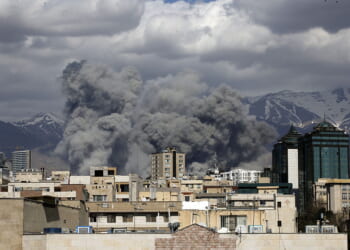White House Press Secretary Karoline Leavitt today denied a report that the U.S. is seeking to establish a military base near Gaza for use by international peacekeeping forces.
“This article was based on a single piece of paper — an inquiry that somebody in the Department of Navy made about an idea that may happen in the future, and this reporter deemed that as an official plan,” Leavitt said. “I checked with the highest levels of the United States federal government. This is not something the United States is interested in being engaged in. Sometimes we see reporters take a piece of paper like this and just deem it as official policy, and sometimes that misleads people a little bit.”
It is noteworthy that the report appeared in an Israeli publication. There is, and almost certainly will continue to be, a level of anxiety in Israel over whether the American-led cease-fire-enforcement efforts will tie Jerusalem’s hands indefinitely.
The initial report, by Ynet/Shomrim, suggested the project had a price tag of about $500 million and that officials had begun scouting locations. “It’s hard to overstate the significance of building such a base,” an Israeli official told the outlet. “Since the Six-Day War, Israel has sought to minimize international involvement in the territories. The establishment of an American base on Israeli soil shows just how determined Washington is to be involved in Gaza and the broader Israeli-Palestinian conflict.”
Washington’s hands-on approach to monitoring the cease-fire has been framed in a narrative of Israeli sovereignty sensitivities from the moment the deal was signed.
In October, a week-long procession of American officials dispatched to Israel set off accusations of “Bibi-sitting”—that Vice President JD Vance had been sent to keep an eye on the Netanyahu government and to reinforce the Trump administration’s investment in sustaining the cease-fire.
“It’s not about monitoring in the sense of, you know, you monitor a toddler,” Vance told the media in response to a question about direct U.S. oversight of the deal. “It’s about monitoring in the sense that there’s a lot of work, a lot of good people who are doing that work, and it’s important for the principals in the administration to keep on ensuring that our people are doing what we need them to do.”
The concept of “Bibi-sitting” had been coined to prevent any low-level provocation by Hamas from being interpreted by the Israelis as a wholesale abrogation of the cease-fire terms that would pave the way for renewed war. This idea always was based on an overestimation of Netanyahu’s desire to keep fighting—the cease-fire deal was what the prime minister wanted and needed for his own political legitimacy as well as his own peace of mind. (Contrary to the rather vulgar narrative on this side of the ocean, Netanyahu did not actually want his country plunged into an endless war of attrition.) But it was also true that Netanyahu couldn’t afford to be made to look a fool if Hamas learned it could flout the deal without consequence.
Vance, to his great credit, has never once dramatized the situation or overreacted to a perceived threat to the cease-fire. He went to Israel, told everyone in the media to calm down and let folks do their jobs, and went home. Secretary of State Marco Rubio would make his own trip, and Steve Witkoff and Jared Kushner will pop in from time to time as well.
Some of the questions around the U.S. role in the cease-fire seemed designed to pick a fight. It was suggested that perhaps Israel was being put in the role of a “vassal” state. Netanyahu had a good response to this: “One week they say that Israel controls the United States. A week later, they say the United States controls Israel.”
Still, questions persisted. An Israeli official complained to the Times of Israel that at Kiryat Gat, the headquarters of the stabilization team, Israel was playing second fiddle, and that Israeli agencies were relegated to “contractor” roles.
Former Ambassador to the U..S Michael Oren expressed similar concerns. He acknowledged that the Israeli military rarely has full freedom of action and that most wars end when the U.S. tells Israel to stop fighting. Still, Oren wrote, “there is a huge difference between receiving an order to stop fighting and the need to receive approval every time we must act. This is the situation today when there are 200 American soldiers in Kiryat Gat and American drones are flying over Gaza.”
Fortunately, Oren says, President Trump knows Israel needs to be able to respond to Hamas’s violations. I would add that Trump has been careful not to ask Israel to do anything that would grant Hamas a loophole around its obligations under the deal. Also, while some fret over the presence of troops from European (read: unfriendly) countries, for now it appears those countries’ leaders are following Trump’s lead consciously and carefully.
The question, then, is less about Trump and the near future than about the post-Trump future. The U.S. isn’t seeking a forever force in Gaza, but no rebuilding mission takes exactly as long as it is budgeted for. Further, any extension—which is likely—of a peacekeeping force will give it an air of semi-permanence, and it will act accordingly.
Trump has positioned himself as the indispensable man of the Gaza cease-fire. On balance, that is surely preferable to the alternatives. But there’s a clock on his presidency and a competition to succeed him that will ensure the “sovereignty” question remains near the front of Israeli minds.


















